Footprints of Love from the 921 Earthquake
By Ye Zi-hao (葉子豪)
Abridged and translated by Syharn Shen (沈思含)
Footprints of Love from the 921 Earthquake
By Ye Zi-hao (葉子豪)
Abridged and translated
by Syharn Shen (沈思含)
On the fateful early hours of September 21, 1999, a catastrophic earthquake shook central Taiwan. "What can I do to help?" was the first thing that came to the minds of Tzu Chi volunteers, who immediately devoted themselves to the relief work and left footprints of love that will never be forgotten.
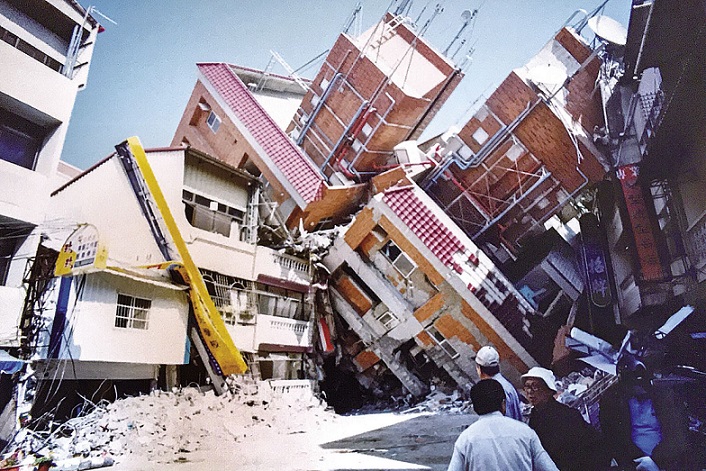
Located on the Chelongpu fault zone, Dongshi Township in Taichung County had the highest number of casualties from the 921 Earthquake, with many buildings destroyed and over 300 people dead. (Photo provided by Wang Yi-fan)
At 1:47 a.m. local time on September 21, 1999, Taiwan was struck by a massive earthquake. Startled from sleep, people panicked and tried to escape amidst cries for help. But for some, they had no chance to ever wake up again.
People's memories of that earthquake 20 years ago may have become vague and distant, but for those who have lost their family and for those who gave of themselves to help, the 921 Earthquake was a major event that has left a deep imprint in their lives.
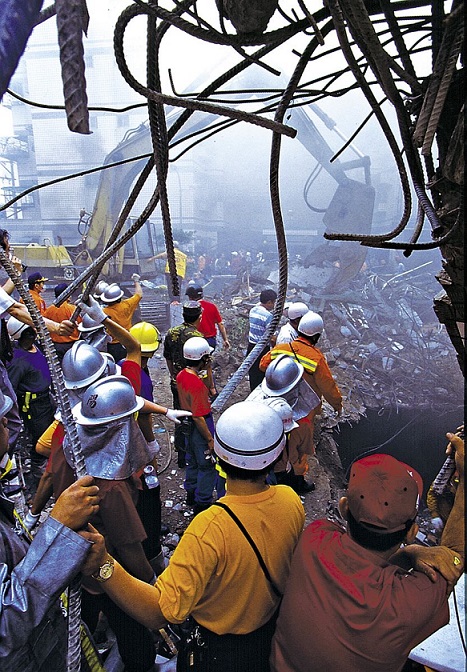
At the site of three collapsed buildings in Taipei, rescuers race against time to find survivors under the rubble. The 921 Earthquake damaged over 100,000 buildings in Taiwan. Rescue teams from 20 countries also arrived to lend their helping hand. (Photo by Guo Yi-de)
The Fateful Morning
The 7.3-magnitude earthquake was only 8 kilometers deep, with its epicenter located in Jiji Township of Nantou County in central Taiwan—hence the 921 Earthquake is also known as the Jiji Earthquake. In a matter of moments, Nantou County and Taichung County in central Taiwan were devastated, and reports of casualties soon came from both southern and northern Taiwan. According to government data, the quake that shook for 102 seconds killed 2,415 lives and damaged over 108,000 buildings.
Tzu Chi volunteer Lin Shen (林慎), whose home was in Nantou's Jiji Township, recalled that fateful morning. She had just finished doing Tzu Chi's work and housework, and had just laid down on her bed shortly. Suddenly, she felt the bed starting to rock. Thinking that the temblor will soon pass, Lin didn't pay attention to it, and it was not until she heard the shattering sounds of fallen objects that she realized the immediate danger she was in.
"When I got up from bed, the door was closed and stuck. I had to use all my strength to push it open to get to my mother-in-law and carry her out in my arms," recollected Lin. Her daughter came to her in a panic, saying that there were many people dead. Lin left her house on a motorcycle to survey the disaster. With the power cut, the streets were pitch-dark, and along the way, she saw people crying desperately and calling out for help.
Lin headed to the fire station to seek help, only to learn from the staff staying behind that all crew members were already out racing against time to save lives. In the catastrophic earthquake that left a trail of destruction, Lin's sister-in-law was also killed, and her body was still entrapped in a collapsed building as rescuers strove to save those alive first.
Communication was cut off, so Lin suppressed her grief and went to the local water plant to borrow a phone and seek help. The staff there anxiously entered the office and brought the telephone out for Lin to call the Jing Si Abode in Hualien.
"You have to remain calm, and remember not to let people go hungry," said Dharma Master Cheng Yen, speaking from the other end of the telephone line. "Take good care of the survivors. If you need anything, seek help from our office in Taichung. I'll send support immediately."
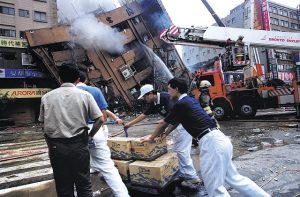
Near a toppled building in Taipei, Tzu Chi volunteers have set up a service station and were ready to provide survivors and rescuers with support and supplies. (Photo by Lin Feng-qi)
Lin's phone call to Master Cheng Yen was at around 5 a.m. Hours before, at 3 a.m., Tzu Chi's headquarters in Hualien had already set up a disaster relief coordination center. In Taichung, one of the worst-hit areas, Tzu Chi's staff member Xiao Huite (蕭惠特) returned to the office at 2:05 a.m. As reports of the disaster started to flood in, the staff soon mobilized to help. Tzu Chi volunteers from all over Taiwan also responded immediately. "If I'm still alive, I'm helping out!" became a shared sentiment of Tzu Chi volunteers who survived the earthquake. Some searched through debris with their bare hands to save neighbors, and many others, despite suffering from losses and damages, put aside their personal loss to help other survivors in need.
"There was so much to be done, and the emergency relief was planned in stages. First was the distribution of aid supplies, then the provision of hot meals, the setting up of medical stations, and the survey of collapsed buildings," elementary school teacher Ceng Cai-cin (曾彩琴) recalled on Tzu Chi's relief work then. After the quake struck, she swiftly swept away the shattered glass in her home, changed into her Tzu Chi uniform and went out to help. After dark, she didn't return to her damaged house. "My family were all staying at the sports ground of a local junior high school, but I didn't join them. There was Tzu Chi's work to be done. To stay near and be on call, I slept in my car."
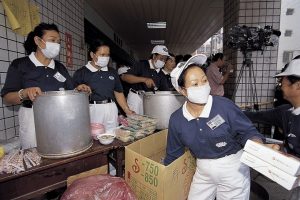
Near three collapsed buildings in Taipei, Tzu Chi volunteers prepared boxed meals and hot soup for quake survivors and rescuers. After the 921 Earthquake, Tzu Chi set up 30 major stations that offered hot meals. (Photo by Guo Yi-de)
Tzu Chi set up 30 relief stations in different parts of Taichung and Nantou, providing survivors and rescuers with hot meals, food, tents, lights, blankets, sleeping bags, and other supplies around the clock.
Knowing that the survivors took nothing with them as they escaped from their homes, Master Cheng Yen told Tzu Chi volunteers to quickly hand out emergency cash for the survivors. But due to power outages in Taipei and Taichung, banks were closed and even ATMs didn't work, so Tzu Chi's headquarters in Hualien withdrew NT$20,000,000 (or US$633,312) of cash and immediately sent the money to the disaster-hit areas.
All of Taiwan Mobilized to Help
At about 10 a.m. on September 21, Tzu Chi volunteers from Taichung were the first to arrive to Jiji Township Office, bringing relief supplies. Survivors were relieved at the sight of aid and the Tzu Chi flag fluttering in the wind.
Tzu Chi volunteers from all across Taiwan have mobilized and were assigned work in the disaster areas of northern and central Taiwan to survey the disaster, visit those affected, hand out supplies, and prepare food.
The army, police, and fire brigades have also mobilized for disaster relief. Tzu Chi volunteer Gu Feng-tai (谷風泰), then serving as a colonel in the Army Command Headquarters, was among the first people who was involved in the relief efforts.
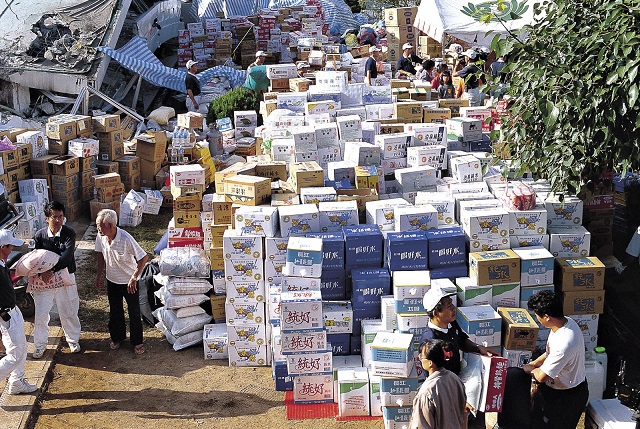
After the earthquake, supplies poured in from across Taiwan. In one of the worst-hit areas in Nantou County, Tzu Chi volunteers organize supplies to be handed out to the earthquake survivors. (Photo by Hsiao Yiu-hwa) |
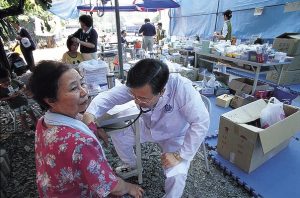
In the afternoon of September 21, 1999, the staff of Hualien Tzu Chi Hospital and members of Tzu Chi's International Medical Association have formed medical teams and arrived at eight different locations in the worst-hit disaster areas to provide medical care to the local survivors. (Photo by Guo Yi-de) |
On the fateful early hours of September 21, 1999, a catastrophic earthquake shook central Taiwan. "What can I do to help?" was the first thing that came to the minds of Tzu Chi volunteers, who immediately devoted themselves to the relief work and left footprints of love that will never be forgotten.

Located on the Chelongpu fault zone, Dongshi Township in Taichung County had the highest number of casualties from the 921 Earthquake, with many buildings destroyed and over 300 people dead. (Photo provided by Wang Yi-fan)
At 1:47 a.m. local time on September 21, 1999, Taiwan was struck by a massive earthquake. Startled from sleep, people panicked and tried to escape amidst cries for help. But for some, they had no chance to ever wake up again.
People's memories of that earthquake 20 years ago may have become vague and distant, but for those who have lost their family and for those who gave of themselves to help, the 921 Earthquake was a major event that has left a deep imprint in their lives.

At the site of three collapsed buildings in Taipei, rescuers race against time to find survivors under the rubble. The 921 Earthquake damaged over 100,000 buildings in Taiwan. Rescue teams from 20 countries also arrived to lend their helping hand. (Photo by Guo Yi-de)
The Fateful Morning
The 7.3-magnitude earthquake was only 8 kilometers deep, with its epicenter located in Jiji Township of Nantou County in central Taiwan—hence the 921 Earthquake is also known as the Jiji Earthquake. In a matter of moments, Nantou County and Taichung County in central Taiwan were devastated, and reports of casualties soon came from both southern and northern Taiwan. According to government data, the quake that shook for 102 seconds killed 2,415 lives and damaged over 108,000 buildings.
Tzu Chi volunteer Lin Shen (林慎), whose home was in Nantou's Jiji Township, recalled that fateful morning. She had just finished doing Tzu Chi's work and housework, and had just laid down on her bed shortly. Suddenly, she felt the bed starting to rock. Thinking that the temblor will soon pass, Lin didn't pay attention to it, and it was not until she heard the shattering sounds of fallen objects that she realized the immediate danger she was in.
"When I got up from bed, the door was closed and stuck. I had to use all my strength to push it open to get to my mother-in-law and carry her out in my arms," recollected Lin. Her daughter came to her in a panic, saying that there were many people dead. Lin left her house on a motorcycle to survey the disaster. With the power cut, the streets were pitch-dark, and along the way, she saw people crying desperately and calling out for help.
Lin headed to the fire station to seek help, only to learn from the staff staying behind that all crew members were already out racing against time to save lives. In the catastrophic earthquake that left a trail of destruction, Lin's sister-in-law was also killed, and her body was still entrapped in a collapsed building as rescuers strove to save those alive first.
Communication was cut off, so Lin suppressed her grief and went to the local water plant to borrow a phone and seek help. The staff there anxiously entered the office and brought the telephone out for Lin to call the Jing Si Abode in Hualien.
"You have to remain calm, and remember not to let people go hungry," said Dharma Master Cheng Yen, speaking from the other end of the telephone line. "Take good care of the survivors. If you need anything, seek help from our office in Taichung. I'll send support immediately."

Near a toppled building in Taipei, Tzu Chi volunteers have set up a service station and were ready to provide survivors and rescuers with support and supplies. (Photo by Lin Feng-qi)
Lin's phone call to Master Cheng Yen was at around 5 a.m. Hours before, at 3 a.m., Tzu Chi's headquarters in Hualien had already set up a disaster relief coordination center. In Taichung, one of the worst-hit areas, Tzu Chi's staff member Xiao Huite (蕭惠特) returned to the office at 2:05 a.m. As reports of the disaster started to flood in, the staff soon mobilized to help. Tzu Chi volunteers from all over Taiwan also responded immediately. "If I'm still alive, I'm helping out!" became a shared sentiment of Tzu Chi volunteers who survived the earthquake. Some searched through debris with their bare hands to save neighbors, and many others, despite suffering from losses and damages, put aside their personal loss to help other survivors in need.
"There was so much to be done, and the emergency relief was planned in stages. First was the distribution of aid supplies, then the provision of hot meals, the setting up of medical stations, and the survey of collapsed buildings," elementary school teacher Ceng Cai-cin (曾彩琴) recalled on Tzu Chi's relief work then. After the quake struck, she swiftly swept away the shattered glass in her home, changed into her Tzu Chi uniform and went out to help. After dark, she didn't return to her damaged house. "My family were all staying at the sports ground of a local junior high school, but I didn't join them. There was Tzu Chi's work to be done. To stay near and be on call, I slept in my car."

Near three collapsed buildings in Taipei, Tzu Chi volunteers prepared boxed meals and hot soup for quake survivors and rescuers. After the 921 Earthquake, Tzu Chi set up 30 major stations that offered hot meals. (Photo by Guo Yi-de)
Tzu Chi set up 30 relief stations in different parts of Taichung and Nantou, providing survivors and rescuers with hot meals, food, tents, lights, blankets, sleeping bags, and other supplies around the clock.
Knowing that the survivors took nothing with them as they escaped from their homes, Master Cheng Yen told Tzu Chi volunteers to quickly hand out emergency cash for the survivors. But due to power outages in Taipei and Taichung, banks were closed and even ATMs didn't work, so Tzu Chi's headquarters in Hualien withdrew NT$20,000,000 (or US$633,312) of cash and immediately sent the money to the disaster-hit areas.
All of Taiwan Mobilized to Help
At about 10 a.m. on September 21, Tzu Chi volunteers from Taichung were the first to arrive to Jiji Township Office, bringing relief supplies. Survivors were relieved at the sight of aid and the Tzu Chi flag fluttering in the wind.
Tzu Chi volunteers from all across Taiwan have mobilized and were assigned work in the disaster areas of northern and central Taiwan to survey the disaster, visit those affected, hand out supplies, and prepare food.
The army, police, and fire brigades have also mobilized for disaster relief. Tzu Chi volunteer Gu Feng-tai (谷風泰), then serving as a colonel in the Army Command Headquarters, was among the first people who was involved in the relief efforts.

After the earthquake, supplies poured in from across Taiwan. In one of the worst-hit areas in Nantou County, Tzu Chi volunteers organize supplies to be handed out to the earthquake survivors. (Photo by Hsiao Yiu-hwa)

In the afternoon of September 21, 1999, the staff of Hualien Tzu Chi Hospital and members of Tzu Chi's International Medical Association have formed medical teams and arrived at eight different locations in the worst-hit disaster areas to provide medical care to the local survivors. (Photo by Guo Yi-de)
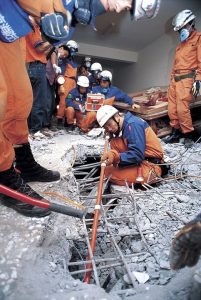
In Zhongliao Township in Nantou County, the rescue team from Japan uses a life detector to check for survivors still alive under the rubble. (Photo by Hsiao Yiu-hwa)
Having also set up a disaster relief coordination center in Taichung, the Army Command Headquarters issued an operations order to dispatch a troop of around 3,000 men to arrive Jiji Township by 6 a.m. to support relief efforts.
Serving at the relief coordination center, Gu was in charge of planning the daily relief work as well as the coordination and dispatch of manpower and machines, including equipment from the private sector. He was involved in the relief work for an entire month.
During the first 72 hours that are critical for saving lives, soldiers, firefighters, and rescue volunteers were in a race against the clock to save people from under the rubble. Thirty-eight rescue teams from twenty countries around the world including Japan, Russia, South Korea, and the U.S. also arrived to lend a helping hand. After tireless efforts, some were fortunately rescued, but there were many who died from severe injuries.
"The army brought many body bags to Jiji Township as there were so many people killed there," Gu lamented. Tzu Chi also provided 1,600 body bags and borrowed ten refrigerated containers from China Shipbuilding Corporation to store the bodies of the deceased. Tzu Chi volunteer Lee Tsung-chi (李宗吉), who was a tycoon in the cargo and shipping industry, also transported two refrigerated containers to central Taiwan.
As the bodies were stacked on top of one another in the refrigerated containers, Tzu Chi volunteers went into the containers to turn the bodies over every 30 minutes to prevent them from sticking to one another in the freezing temperature. They also gave prayer beads to the soldiers who were transporting the dead bodies, hoping to bring some comfort and peace to these young men who were shocked and overwhelmed by death.
At the time, Gu remembers seeing a group of volunteers setting up tents and cooking food in the disaster areas, offering hot food to soldiers and rescuers. He also vividly recalls seeing people comforting the family of the deceased. It was not until Gu retired from the military and joined Tzu Chi in 2009 that he learned that those people helping out were actually Tzu Chi volunteers.
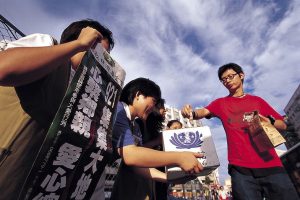
Many people made donations as Tzu Chi volunteers took to the streets to raise funds for the quake survivors. (Photo by Hong Hai-peng)
Housing for Quake Survivors
From the moment the earthquake struck on September 21 to the end of that month, Tzu Chi mobilized over 100,000 volunteer shifts as well as provided relief supplies and medical aid to 260,000 people with no homes to return to. With donations from people all across Taiwan, supplies were not lacking, but housing for survivors whose homes were destroyed was a major issue that needed to be solved.
Teacher Ceng Cai-cin recalled the situation at the time. "Since school was suspended after the quake struck, I joined Tzu Chi's relief efforts." When she returned to the school to prepare for classes seven days after the earthquake, it has already been turned into a shelter. Tents set up by the survivors filled the sports ground, and with no electricity or water, it was not easy to maintain sanitary conditions.
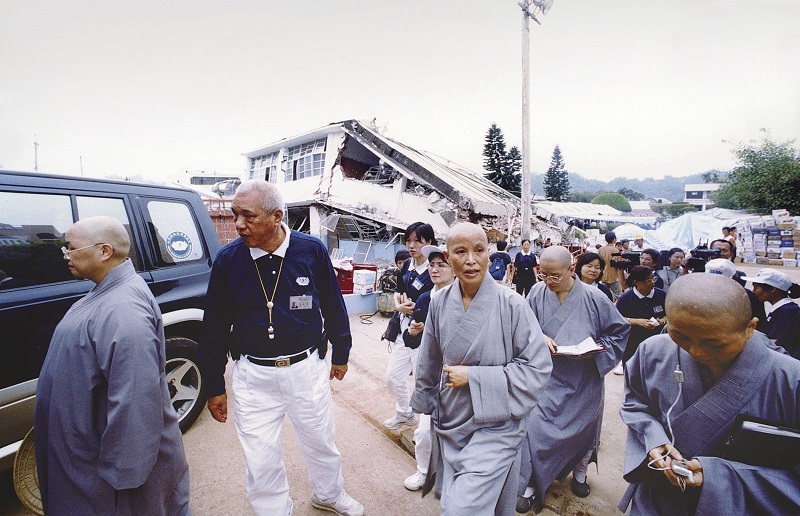
After the 921 Earthquake struck, Master Cheng Yen visited disaster areas and gave instructions for relief work from Taichung. (Photo by Huang Jing-yi)
Living in tents could only be a temporary measure. To help survivors recover from the disaster, Master Cheng Yen gave Tzu Chi volunteers five instructions, which included disinfecting and preventing disease in the disaster areas, setting up sanitary facilities, supporting the government's construction of temporary houses, creating a comprehensive list of relief supplies, and providing long-term care and support for the victims' families.
The Master thought that only when people are settled down physically can they have peace of mind to focus on rebuilding their lives. So, the building of houses for survivors must begin at once. Her approach coincided with the government's plans, but she paid more care and attention to the details, quality, and planning of the construction of houses and communities.
Tzu Chi's temporary houses were designed like a standard residential home of around 40 square meters, complete with a living room, a dining room, a bathroom, and three bedrooms. Tzu Chi hoped to provide survivors with a space to heal as well as give them courage to stand up on their feet again.
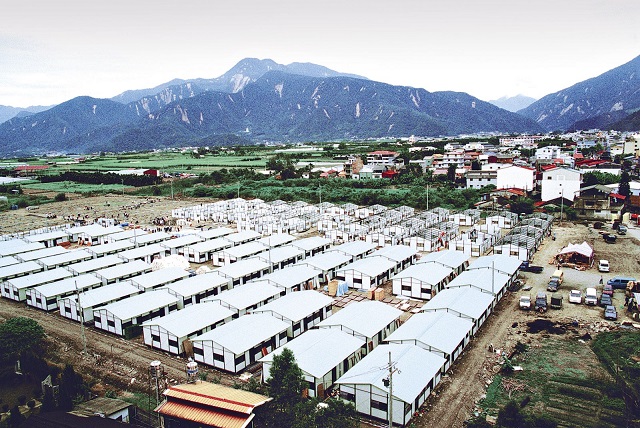
Tzu Chi's temporary houses in Nantou County were already under construction in early October, 1999. In three months after the 921 Earthquake struck, Tzu Chi has built 1,776 temporary houses for the quake survivors. (Photo by Xiao Jin-tan)
Learning that Tzu Chi was building temporary houses for the disaster survivors, the local governments in the disaster areas helped to acquire land. There were also landowners who lent their land to Tzu Chi for free. On September 29, nine days after the earthquake struck, Tzu Chi started to build the first temporary houses.
During the construction period, Tzu Chi volunteers from all over Taiwan and abroad pitched in to help by providing labor and lending their skills. Their shared goal was to speed up the progress of the housing construction. Having been involved in the construction of Tzu Chi's temporary houses, plumber and electrician Chen Jin-chuan (陳金傳) said that after the quake struck, he has driven his car and brought aid supplies to one of the disaster areas. But he soon joined Tzu Chi's relief work, thinking that compared to bringing aid on his own, it was better and more efficient to help out through organized efforts.
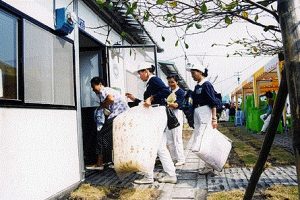
Tzu Chi volunteers help an elderly survivor move into one of the temporary houses, which come with furniture, home appliances, and daily necessities. The grandma said, "I thought it was already so good of Tzu Chi to give me a house to live. I didn't know that they even prepared all kinds of daily necessities for us. It's like moving into a new home!" (Photo by Wu Bao-tong)
Speaking about the construction of Tzu Chi's temporary houses, Chen said, "This is my profession, so I know how long it'd take for an installation or work to be completed. Yet, with so many people working hard together, the entire construction process was super fast!" He recalled that there were over 1,000 people on the construction site working together, so the efficiency was great. "You have to be there and see it with your own eyes to really understand that kind of progress and speed. It was like time-lapse photography. One day, the site was cleared and prepared. The next day, the foundation was laid, and not long after, the structure and frames were built. Everyone was racing against time to construct the houses so the quake survivors won't need to sleep more in tents. It's really uncomfortable to sleep in tents!"
On November 15, 1999, 320 temporary houses built by Tzu Chi in Nantou's Puli Township were inaugurated. Tzu Chi volunteer Hong Wu-zheng (洪武正) remembers a young woman with five children who were led by Tzu Chi volunteers to find their house. When they arrived at the house, the woman and the children came together in an embrace, sobbing and crying out loud.
Hong learned that among the five children, one was the daughter of the woman's brother-in-law. On the woman's back was the child of another brother-in-law. Both brothers-in-law, their wives, and even her own husband died in the earthquake. Shedding tears of despair, the young woman said that she was the only remaining adult in the family, and she didn't know what to do. Tzu Chi volunteers quickly listed her as an aid recipient to tide her over.
Since September 29 when the construction of the first temporary houses began, Tzu Chi volunteers from Taiwan and abroad as well as the general public offered over 180,000 volunteer shifts to help build the houses. Three months later, on December 28, more than 1,700 temporary houses were completed.
While continuing to care for the survivors living in the temporary houses, Tzu Chi volunteers also focused on rebuilding schools destroyed or damaged by the earthquake. Members of Tzu Chi Teachers' Association and Tzu Chi's collegiate volunteers also went to these schools to hold activities as well as summer and winter camps to support the local children heal from the trauma left by the disaster.
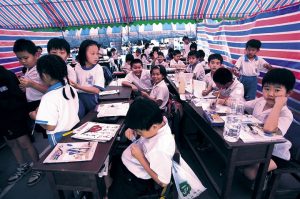
One week after the 921 Earthquake struck, students of Ruei Chen Elementary School in Taichung resumed their classes in tents. The earthquake damaged 293 schools in Taiwan. (Photo by Lin Feng-qi) |
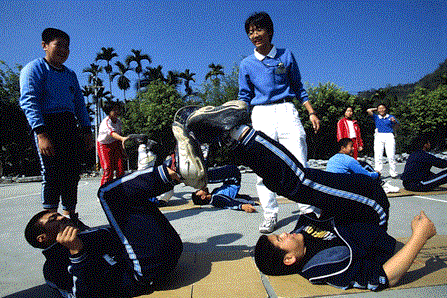
Tzu Chi's collegiate volunteers visit schools damaged by the 921 Earthquake to hold various activities for the local students. (Photo by Lin Feng-qi) |

In Zhongliao Township in Nantou County, the rescue team from Japan uses a life detector to check for survivors still alive under the rubble. (Photo by Hsiao Yiu-hwa)
Having also set up a disaster relief coordination center in Taichung, the Army Command Headquarters issued an operations order to dispatch a troop of around 3,000 men to arrive Jiji Township by 6 a.m. to support relief efforts.
Serving at the relief coordination center, Gu was in charge of planning the daily relief work as well as the coordination and dispatch of manpower and machines, including equipment from the private sector. He was involved in the relief work for an entire month.
During the first 72 hours that are critical for saving lives, soldiers, firefighters, and rescue volunteers were in a race against the clock to save people from under the rubble. Thirty-eight rescue teams from twenty countries around the world including Japan, Russia, South Korea, and the U.S. also arrived to lend a helping hand. After tireless efforts, some were fortunately rescued, but there were many who died from severe injuries.
"The army brought many body bags to Jiji Township as there were so many people killed there," Gu lamented. Tzu Chi also provided 1,600 body bags and borrowed ten refrigerated containers from China Shipbuilding Corporation to store the bodies of the deceased. Tzu Chi volunteer Lee Tsung-chi (李宗吉), who was a tycoon in the cargo and shipping industry, also transported two refrigerated containers to central Taiwan.
As the bodies were stacked on top of one another in the refrigerated containers, Tzu Chi volunteers went into the containers to turn the bodies over every 30 minutes to prevent them from sticking to one another in the freezing temperature. They also gave prayer beads to the soldiers who were transporting the dead bodies, hoping to bring some comfort and peace to these young men who were shocked and overwhelmed by death.
At the time, Gu remembers seeing a group of volunteers setting up tents and cooking food in the disaster areas, offering hot food to soldiers and rescuers. He also vividly recalls seeing people comforting the family of the deceased. It was not until Gu retired from the military and joined Tzu Chi in 2009 that he learned that those people helping out were actually Tzu Chi volunteers.

Many people made donations as Tzu Chi volunteers took to the streets to raise funds for the quake survivors. (Photo by Hong Hai-peng)
Housing for Quake Survivors
From the moment the earthquake struck on September 21 to the end of that month, Tzu Chi mobilized over 100,000 volunteer shifts as well as provided relief supplies and medical aid to 260,000 people with no homes to return to. With donations from people all across Taiwan, supplies were not lacking, but housing for survivors whose homes were destroyed was a major issue that needed to be solved.
Teacher Ceng Cai-cin recalled the situation at the time. "Since school was suspended after the quake struck, I joined Tzu Chi's relief efforts." When she returned to the school to prepare for classes seven days after the earthquake, it has already been turned into a shelter. Tents set up by the survivors filled the sports ground, and with no electricity or water, it was not easy to maintain sanitary conditions.

After the 921 Earthquake struck, Master Cheng Yen visited disaster areas and gave instructions for relief work from Taichung. (Photo by Huang Jing-yi)
Living in tents could only be a temporary measure. To help survivors recover from the disaster, Master Cheng Yen gave Tzu Chi volunteers five instructions, which included disinfecting and preventing disease in the disaster areas, setting up sanitary facilities, supporting the government's construction of temporary houses, creating a comprehensive list of relief supplies, and providing long-term care and support for the victims' families.
The Master thought that only when people are settled down physically can they have peace of mind to focus on rebuilding their lives. So, the building of houses for survivors must begin at once. Her approach coincided with the government's plans, but she paid more care and attention to the details, quality, and planning of the construction of houses and communities.
Tzu Chi's temporary houses were designed like a standard residential home of around 40 square meters, complete with a living room, a dining room, a bathroom, and three bedrooms. Tzu Chi hoped to provide survivors with a space to heal as well as give them courage to stand up on their feet again.

Tzu Chi's temporary houses in Nantou County were already under construction in early October, 1999. In three months after the 921 Earthquake struck, Tzu Chi has built 1,776 temporary houses for the quake survivors. (Photo by Xiao Jin-tan)
Learning that Tzu Chi was building temporary houses for the disaster survivors, the local governments in the disaster areas helped to acquire land. There were also landowners who lent their land to Tzu Chi for free. On September 29, nine days after the earthquake struck, Tzu Chi started to build the first temporary houses.
During the construction period, Tzu Chi volunteers from all over Taiwan and abroad pitched in to help by providing labor and lending their skills. Their shared goal was to speed up the progress of the housing construction. Having been involved in the construction of Tzu Chi's temporary houses, plumber and electrician Chen Jin-chuan (陳金傳) said that after the quake struck, he has driven his car and brought aid supplies to one of the disaster areas. But he soon joined Tzu Chi's relief work, thinking that compared to bringing aid on his own, it was better and more efficient to help out through organized efforts.

Tzu Chi volunteers help an elderly survivor move into one of the temporary houses, which come with furniture, home appliances, and daily necessities. The grandma said, "I thought it was already so good of Tzu Chi to give me a house to live. I didn't know that they even prepared all kinds of daily necessities for us. It's like moving into a new home!" (Photo by Wu Bao-tong)
Speaking about the construction of Tzu Chi's temporary houses, Chen said, "This is my profession, so I know how long it'd take for an installation or work to be completed. Yet, with so many people working hard together, the entire construction process was super fast!" He recalled that there were over 1,000 people on the construction site working together, so the efficiency was great. "You have to be there and see it with your own eyes to really understand that kind of progress and speed. It was like time-lapse photography. One day, the site was cleared and prepared. The next day, the foundation was laid, and not long after, the structure and frames were built. Everyone was racing against time to construct the houses so the quake survivors won't need to sleep more in tents. It's really uncomfortable to sleep in tents!"
On November 15, 1999, 320 temporary houses built by Tzu Chi in Nantou's Puli Township were inaugurated. Tzu Chi volunteer Hong Wu-zheng (洪武正) remembers a young woman with five children who were led by Tzu Chi volunteers to find their house. When they arrived at the house, the woman and the children came together in an embrace, sobbing and crying out loud.
Hong learned that among the five children, one was the daughter of the woman's brother-in-law. On the woman's back was the child of another brother-in-law. Both brothers-in-law, their wives, and even her own husband died in the earthquake. Shedding tears of despair, the young woman said that she was the only remaining adult in the family, and she didn't know what to do. Tzu Chi volunteers quickly listed her as an aid recipient to tide her over.
Since September 29 when the construction of the first temporary houses began, Tzu Chi volunteers from Taiwan and abroad as well as the general public offered over 180,000 volunteer shifts to help build the houses. Three months later, on December 28, more than 1,700 temporary houses were completed.
While continuing to care for the survivors living in the temporary houses, Tzu Chi volunteers also focused on rebuilding schools destroyed or damaged by the earthquake. Members of Tzu Chi Teachers' Association and Tzu Chi's collegiate volunteers also went to these schools to hold activities as well as summer and winter camps to support the local children heal from the trauma left by the disaster.

One week after the 921 Earthquake struck, students of Ruei Chen Elementary School in Taichung resumed their classes in tents. The earthquake damaged 293 schools in Taiwan. (Photo by Lin Feng-qi)

Tzu Chi's collegiate volunteers visit schools damaged by the 921 Earthquake to hold various activities for the local students. (Photo by Lin Feng-qi)
Settling Down for Recovery
In May 2019, Tzu Chi volunteers invited residents of Tzu Chi's temporary houses in Puli Township of Nantou County to gather together and share about their lives over the past two decades since the 921 Earthquake.
Kao Zongyang (高宗暘) was a teacher at a vocational high school who lost his home to the earthquake. He felt fortunate to be able to live in Tzu Chi's temporary house, which provided a haven for his family so they could focus on recovering from the disaster.
"If we rented a house back then, it'd be very different. My wife was horrified of earthquakes, to the point that she'd be scared of old houses, especially those built with bricks." Kao said. When his family moved into Tzu Chi's temporary house, Kao's wife said to him with great relief, "Living here, I won't be scared of earthquakes anymore!" Kao really liked the environment and enjoyed returning home right after work.
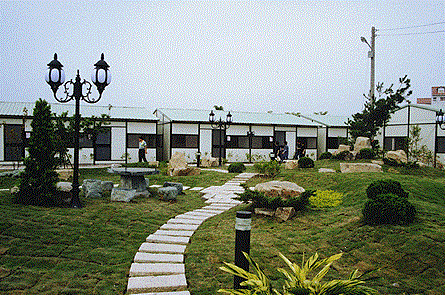
To provide a good living environment for the earthquake survivors and make them feel more at home, Tzu Chi's temporary houses had spaces in between and were surrounded by plants and landscape design. Tzu Chi also built community centers, parking lots, and other public facilities for the residents. (Photo by Xiao Jin-tan)
"When we were moving out from the temporary house, we didn't know who to say thanks to. Now, 17 years later, our opportunity to express our gratitude has finally come. Thank you so much!" said Kao, who is grateful to Tzu Chi for helping him and his family in their hour of need. Now retired, Kao is giving back by volunteering and helping others in need.
"For the past two decades, Tzu Chi volunteers' continuous care and support gave me courage to face the future," said Xu Feng-zhu (徐逢助). His house collapsed due to the earthquake, and to make ends meet and support his family of five, he had to take up part-time jobs in addition to his full-time work. He is grateful for Tzu Chi's temporary house, which allowed him to focus on his work. Looking back, the now 60-year-old Xu said, "Having received Tzu Chi's help, I've become a Tzu Chi donating member. I hope to help other people in need."
Looking back twenty years ago when the 921 Earthquake devastated Taiwan and altered people's lives, not only have the memories of those who have given selflessly remained alive and unforgotten in people's minds, but the love and goodness that supported lives through the disaster have also been spread and passed on.
The 921 Earthquake
- Local time: 01:47 on September 21, 1999
- Magnitude: 7.3
- Epicenter: Jiji Township, Nantou County, Taiwan
- Depth: 8 km
- Duration: 102 seconds
- 2,415 dead
- 29 missing
- 11,305 injured
- 51,711 buildings destroyed
- 53,769 buildings damaged
- Estimated loss: around NT$ 364.7 billion (or around US$11.5 billion)
Tzu Chi's Relief Efforts
- Set up 31 service stations to provide relief supplies
- Set up 30 large cooking stations to offer hot food
- Provided 1,600 body bags
- Borrowed 12 refrigerated containers to store bodies
- Set up 19 medical stations to offer free clinics in the disaster areas
- Provided medical care for 2 months
- Mobilized 2,052 medical volunteer shifts
- Built and rebuilt a total of 1,776 temporary buildings, including houses, a library, a police station, fire stations, and Buddhist temples
- Mobilized over 180,000 volunteer shifts
- Rebuilt 51 schools
Contact Us | Plan a Visit | Donate
8 Lide Road, Beitou 11259, Taipei, Taiwan
886-2-2898-9999
005741@daaitv.com
©Tzu Chi Culture and Communication Foundation
All rights reserved.
